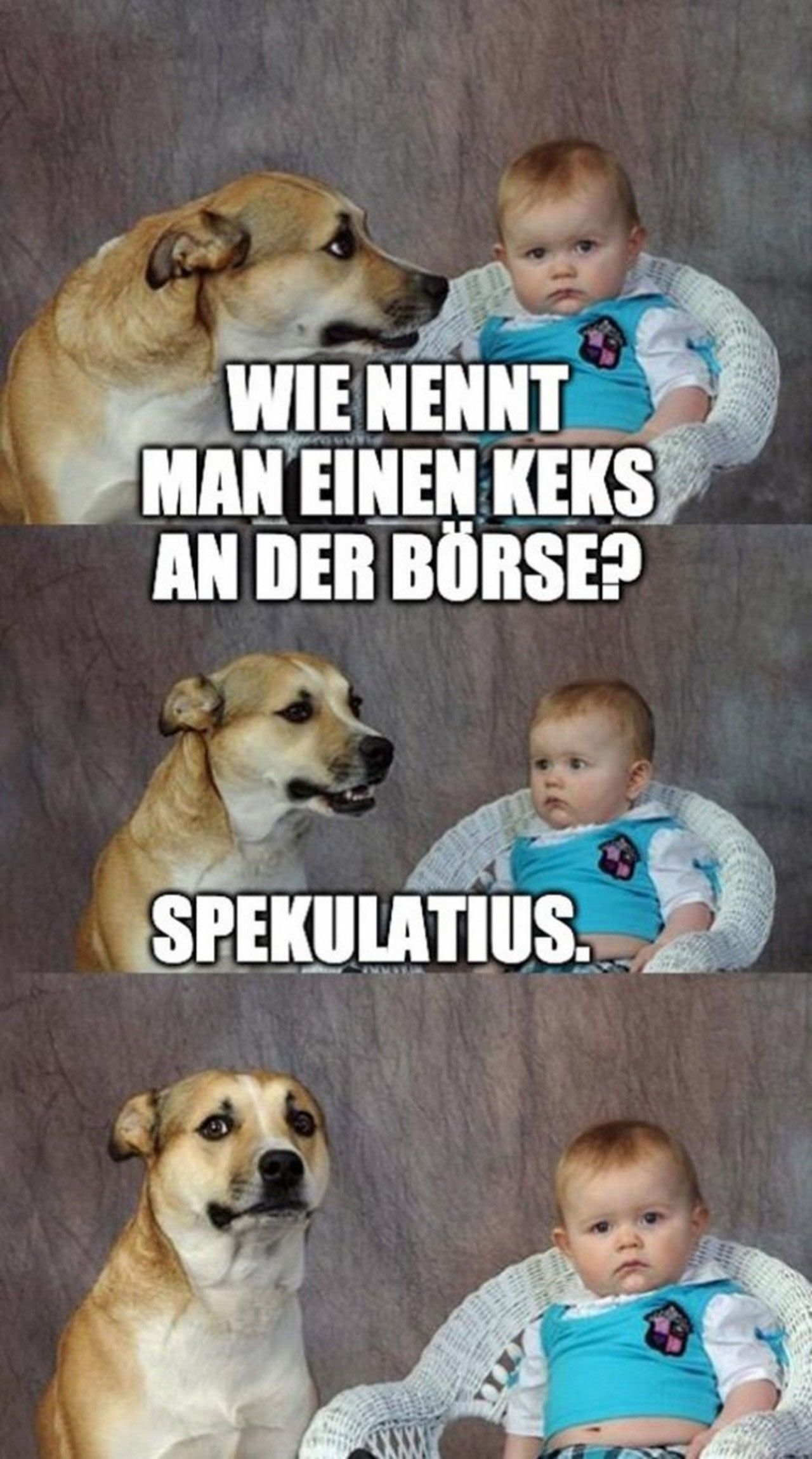The pot is lauging because the boiler is black.
This is a kids pun joke that got lost in translation. Treffen can mean either to meet or to hit (like with a bullet).
Want a funny German joke? Why don’t ants go to church? Because they’re insects!
As an immigrant in Germany, that’s the reason people think Germans aren’t funny. A lot of the humor is pun-based (and sometimes there are many, many more layers, making them actually very good jokes), which just doesn’t translate well.
It’s neat that the ant joke’s pun translates into English, good pick.
An angry Ontarian calls a radio show, and complains about all the Newfies coming to Ontario to take the good jobs. “We aughta build a wall to keep them Newfies out!”
Next call to the radio show is a newfie: “Owshegettinonb’y? Ye by’s be havin’ any jobs bildin tha’ wall or wha’?”
(How are you doing? You guys have any jobs building that wall, or what?)
To explain the joke, as is tradition in Germany. “To meet” translates to “treffen” in German. Which can also mean “to hit something or somebody”.
Once had a multicultural family gathering where we translated the same joke into several languages.
A man knocks at a door. A woman opens and he says: “Hello, my name is Toulouse. I’m here to fuck your daughter.” The woman screams: “To what?!?” He answers calmly: “Toulouse.”
“To meet” translates to “treffen” in German. Which can also mean “to hit something or somebody”.
Join the shooting club, meet new friends.
Schiessen lernen; Freunde treffen! is a popular slogan with German shooting clubs.
Hola, mi nombre es Álvaro, vengo a tirarme/follarme a tu hija.
¿¡¿¡¿A qué?!?!?
Álvaro.
„Hallo, mein
meineName ist Umberto und ich bin hier um Ihre Tochter zu ficken“„UM WAS???“
„Umberto.“
So I’ve been learning German for a couple of months. Wouldn’t it be “mein name?” 🤔 because presumably Umberto is male?
Buy yes, funny joke 😂
Male or female, it’s always “mein” because “Name” is a male noun.
Vielen Dank!
Translated Hungarian joke:
The Székely and his son go into the forest to cut trees. When cutting a tree, the son says:
“Goodbye, my beloved father.”
“Why are you saying a farewell to me?”, asks the Székely.
“Because the tree is falling on you.”
What’s the joke? Are there slow falling trees in Hungary?
This reply made me laugh more than that joke ever did.
In case people are wondering: it’s indeed a german joke.
It’s a pun. “meet” and “hit” are using the same word in german
Come to think of it, that’s a thing in Swedish as well - we could make the pun work there as well:
Två jägare träffades. Båda dog.
Works in Dutch too.
Twee jagers treffen elkaar. Beiden zijn dood.
Båda dog! Båda dog! No Treåt
(I know å is pronounced like “eu” like in Blåhaj. Couldn’t help myself tho)
A Båda dog once bit my sister… No realli!
My hovercraft is full of eels!
For it to match Swedish phonetic rules, it would have to be:
Bäd dågg! Bäd dågg! Nåu trit!
Oh true my bad, thank you!
Well, doing it in properly phonetic Swedish would have ruined the joke a bit in English, so I don’t think it’s a problem.
Wouldn’t it be “Nåo trit”?
I guess it depends on which English accent you’re emulating.
That’s why translation can be so hard, especially for poems, songs, comedy etc. Double meanings, metaphors, rhymes etc are often lost when translated.
I only understand train station.
In some cases you can replace a pun with another pun that works in the target language.
In other cases, where you’re translating a religious text, doing something for scholarly reasons, or you otherwise think your audience would really like to know what’s going on in a text you have to add a translation note.
So it’s a misstranslated joke then. With that information it’s kinda funny or at least it makes sense.
More like untranslatable, as the context just doesn’t work in English. You either have something that doesn’t make sense or - if you use the other meaning - a statement with no humor. The pun is completely dependent on the German phrasing.
treffen.
That joke used to work in English.
By c. 1300, of things, “to come into physical contact with, join by touching or uniting with;” also, of persons, “come together by approaching from the opposite direction; come into collision with, combat.”
https://www.etymonline.com/word/meet
It still can mean collision or fight, but the context needs to be very clear. Two armies meeting on the battlefield, for example. Or two hunters met in combat.
deleted by creator
It’s a bit like the shortest joke: A woman comes at the doctor…
Or in German: Kommt 'ne Frau beim Arzt…
This one works well in German and English, but I assume it’s untranslatable in many other languages.
Stupid question
Does it play on the double meaning of “come” being “to arrive” and “to orgasm”?
Exactly
That. And the fact that doctor jokes have a well known scheme that’s broken here, as you’d normally expect the joke to continue after the sentence.
A woman comes to the doctor and asks “Can I take a bath with my diarrhea?” The doctor answers: “Sure, if it’s enough to fill the tub.”
Thanks 👍

Girl goes to a store and asks: “do you sell pantyhoses?”. The salesman replies: “why? Do you have half an ass?”
Like 90% the “jokes” I heard growing up I couldn’t translate without getting banned for racism.
Like automodded, racism. Basically the “punchline” was often the n-word.
One of my favorite Filipino jokes:
Why didn’t the priest go swimming in the ocean? Because it’s salt water.
“Salt water” in Tagalog can be translated as “tubig asin,” which sounds like the English “too big a sin.” Many Filipino jokes rely on Tagalog and English like that.
Here’s another (putting original Tagalog because it’s kind of relevant):
May joke ako tungkol sa airport kaso NAIA ako eh hehe.
English:
I have a joke about the airport, but I am NAIA (Ninoy Aquino International Airport) hehe.
NAIA sounds like “nahiya,” which means “shy,” so it would sort of translate to “… but I was shy.”
Tubig asin, hahaha, god I wish I were bilingual
We have some like that in England, for example a Frenchman only ever carries one egg because an egg is un oeuf
What?
WE HAVE SOME LIKE THAT IN ENGLAND, FOR EXAMPLE A FRENCHMAN ONLY EVER CARRIES ONE EGG BECAUSE AN EGG IS UN OEUF
Oeuf is French for egg. “Un oeuf” sounds like “enough”
Noice!
Here a joke my english teacher always told us:
What says a Saxon in New York when he wants a Christmas tree? .
A tännchen, please.
The saxon “a tännchen” sounds in english like: attention
One translated from Norwegian:
“Once upon a time… But now it’s a corridor”
I’ll supply the original and an explanation:
“Det var en gang… Men nå er det en korridor”
“Det var en gang” is literally “It was a time/an instance”, and it’s the main way every fairytale starts in Norwegian. But “gang” could also mean hallway.
“Det var en gang” is better translated as “Once upon a time”.
They showed that with their first translation. The second, more literal, translation is to explain the pun.
Two Bulgarians are driving through the countryside when they are pulled over by an officer. “Sorry to bother you”, says the officer, “but I’m looking for two child molesters.”
The Bulgarians look at each other for a moment, turn to the officer, and with a solemn nod say
“We’ll do it.”
Québécois and a French learning Ontarian having a chat. The Ontarians goes - o look a fly, Québécois corrects him- A fly. O - wow you have good eyesight. Wregarde, un mouche- -Non, une mouche
For anyone who doesn’t get it: The joke relies on understanding how Latin languages gender words (Un v. Une, Masculine/Feminine form).So it literally doesn’t work in English. It’s also a common translation error non native speakers have because you only know the “gender” of a word by… Knowing if it’s masculine or feminine through experience.
Best way to carry the joke is:
“Oh look, a/un(male) fly.”
“No, it’s a/une(feminine) fly.”
“Wow, you have good eyes/Wow, you can see it’s genitals from here?”
Certainly clunky but hilarious if you speak French.
Wenn ist das Nunstück git und Slotermeyer? Ja! Beiherhund das Oder die Flipperwaldt gersput!
💀
o hohohohohoho!
Bitte was?
Danke!
💀
Zer ver zwei peanuts walking down der Straße. Von vas assaulted … peanut.

















